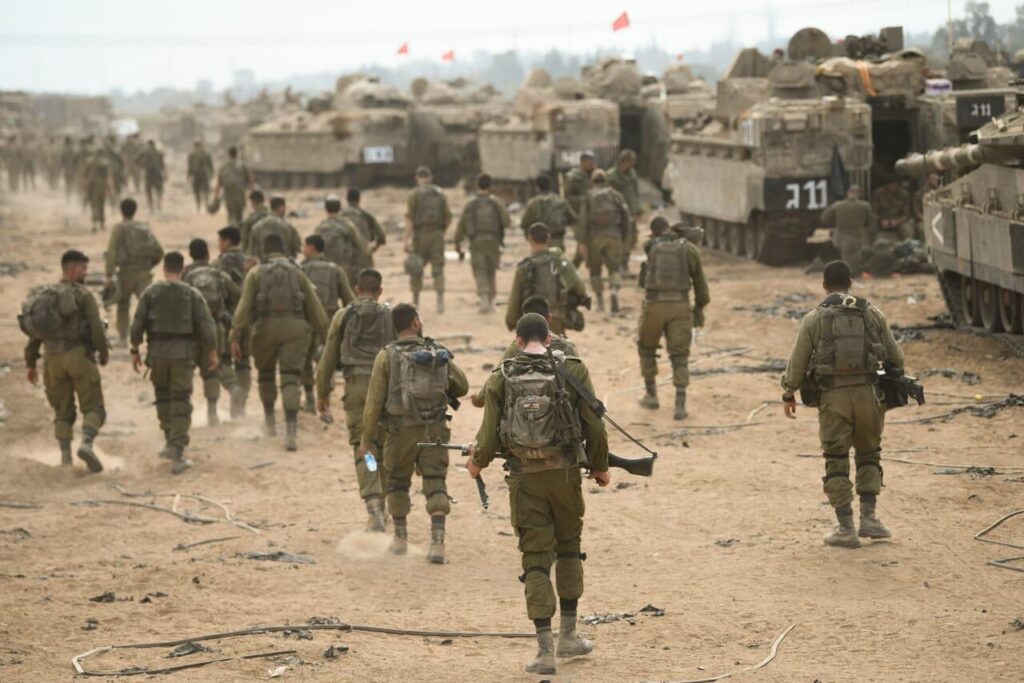Global Fire Power 2023 ranks Israel among the top 20 countries in the world with the greatest military potential. Although the ranking is once again topped by the United States and major powers such as Russia and China, it is striking that a country of only 9.5 million people occupies such a prominent position.
The Stockholm International Peace Research Institute’s (Sipri) final figures for 2022 put Israel’s military expenditure at $23.406 billion – 4.5 per cent of the country’s GDP. On a per capita basis, military spending was $2,623. This is well above the average of even some of the leading powers: Russia’s per capita military expenditure was around $600 and China’s $200.
Even before the creation of the Jewish state in 1948, the Zionist movement was characterised by a high degree of paramilitary organisation. For example, after the Arab uprisings of the 1930s, Jewish society maintained some 15,000 people trained in military discipline. The asymmetry between the strength of the Israeli and Palestinian defence forces became increasingly apparent, as seen in the intifadas – stones against tanks – and as seen today.
A military Silicon Valley in the Middle East
Three companies from the Jewish state occupy the top 34 positions in Defense News’ list of the world’s 100 most prominent arms companies. If there is one thing that distinguishes Israeli weapons, it is the fact that they bear a mark that guarantees their macabre effectiveness: “battle-tested”. The added value is built on blood, because over the years of the Arab-Jewish conflict, the Palestinians have been the test tube for the development and innovation of machinery for death. Israel is known as the military Silicon Valley of the Middle East.
One of the most powerful Israeli arms companies is Rafael Advanced Defense Systems Ltd, founded in 1948, the same year as the Jewish state. It was responsible for building the “Iron Dome”, a macro-defence system capable of intercepting airborne attacks. The infrastructure consists of a sophisticated radar that maps and tracks threats, and a command-and-control system consisting of operators who can decide whether or not to fire interceptors to neutralise attacks. The most visible equipment is the interceptors and mobile launchers, consisting of artillery with advanced guidance systems.
With this world-leading defence dome, Israel is demonstrating its dominant technology, once again proven in conflict. The cost of the system has lived up to expectations: the US alone has invested “more than $200 million to help Israel pay for the system”, according to the BBC.
The United States, the world’s leading military power, is a staunch collaborator with Israel. It pumped 3.8 billion dollars into the Middle Eastern state in 2020 alone. This money is part of a package approved by the Obama administration for the decade 2017-2028, which includes a financial amount of $38,000 million for military aid to Israel.
While the Iron Dome is a testament to Israel’s bellicose disposition, its bastion of “90 per cent effectiveness“, something went wrong with the Hamas offensive on 7 October. The surprise and intensity of the attack – despite its much more rudimentary means – meant that an unsuspecting IDF was unable to respond with its macro-infrastructure.
The war in Gaza is evidence of this imbalance: Israel has state-of-the-art weaponry; Palestine has no regular army. While Israel established itself as an independent state in 1948, recognised by the international community, and created its Israel Defence Forces (IDF) – as well as starting the arms race with the establishment of Rafael Advanced Defence Systems Ltd – Palestine was divided and did not achieve statehood. In the 1990s, with the signing of the Oslo Accords, Palestinian security structures were established, but the course of the conflict and the geographical division – controlled by different factions and governments – never led to a unified military organisation for Palestine.
Violence beyond artillery
Militarisation goes beyond the usual weapons, soldiers, tanks, missiles. Militarisation is also in the concept of punitive and the culture of panic. On several occasions, Israel has used other types of weapons, as in the case of the 2008 Gaza war: the army used white phosphorus, a highly harmful chemical that violates humanitarian law. Another form of violence is the so-called “skunk water”, a combination of chemicals that emit an extremely unpleasant odour. According to testimonies collected by Al-Jazeera from those subjected to this coercive practice, Skunk Water emits something like “the smell of sewage mixed with rotting corpses”.
The liquid, developed by the Israeli company Odortec, is supposedly non-lethal and is used for “crowd deterrence”. However, exposure to skunk water causes severe vomiting, abnormal breathing, stomach and eye pain, skin irritation and even hair loss. Its supposed non-lethality and the permanent damage it can cause are debated, as denounced by Palestinian writer and analyst Yara Hawari, who, along with several Palestinian voices, points out that skunk water has also been used to try to force Palestinian families out of their homes.
In order to force Palestinians to move and thus increase Jewish settlements, Israel imposes the destruction of homes. The system serves as an “exemplary punishment” and a mechanism to confiscate more land. This practice, the “house demolition policy”, not only “threatens the existence of the Palestinian people” but is “collective punishment in violation of humanitarian law”, the UN condemns. In January 2023 alone, “Israel demolished 132 structures in the occupied West Bank, 34 of which were Palestinian homes,” the UN report notes. Between 2009 and 2019, “Israel demolished more than 1,100 structures in the occupied territory of East Jerusalem alone”, says Amnesty International, citing data from the UN Office for the Coordination of Humanitarian Affairs. The policy, which Israel disguises under the premise of “dismantling terrorist cells”, is in fact a response to a dynamic of mass destruction. For Amnesty, “the Israeli authorities have used arbitrary and disproportionate measures in the name of security to extend their control over Palestinian territory and to expel the Palestinian population from areas they consider strategic”.


